VIRGINIA BEACH, Va. — On Monday, Virginia Governor Glenn Youngkin reaffirmed his stance that school boards in the Commonwealth "don't have a choice" in adopting the state's latest transgender student policies.
It comes days after the city's school board came to a split vote in a resolution to adopt the framework, causing the agenda item to not move forward for the time being.
“It is not a right that school divisions can intercede upon. It is a fundamental right in Virginia, the Attorney General came out and clarified that boards don’t have a choice," he said to a reporter gaggle in Virginia Beach.
On the first day of the school system's academic year, Youngkin hosted the fifth "Parents Matter" forum at the Bow Creek Recreation Center, having already made stops in other counties and cities across Virginia.
While discussing an array of education-related topics such as mental health and learning loss, Youngkin started the town hall-style event by touching on the model policies, arguing they are a tool for parents to have a greater say in a transgender student's school experience.
Virginia state code directs school boards to adopt transgender model policies "consistent" with those written by the Virginia Department of Education.
"Until they adopt these polices, they have real legal exposure as individuals and as a board," he said.
So far, at least eight divisions across the state have either discussed the topic or issued public statements against them. Spotsylvania and Pittsylvania counties have adopted some form of the "Privacy, Dignity and Respect" guidelines. At the same time, divisions like Prince William County, Fairfax County, Arlington, and Richmond have come forth with statements saying their old policies go far enough to protect transgender students rights.
When asked about school divisions that said they do not want to adopt new policies for fear of going against federal compliance, Youngkin replied, “The Attorney General was very clear, that our policies are completely consistent with federal policies. So they don’t have a choice. The code is very clear: school divisions will adopt policies consistent with the model policies. There is no light between what they can and can’t do. It’s very clear, the only choice they have is to adopt the policies as written or policies consistent with them."
A statement from Prince William County Schools cited the Grimm vs. Gloucester County School Board court case as part of their decision-making process to keep their old policies:
"... clarified that any public school that denies a transgender student the right to access its school programs and facilities, consistent with the student’s gender identity, is engaging in discrimination on the basis of sex in violation of Title IX and the Equal Protection clause of the U.S. Constitution."
LGBTQ advocates and organizations have criticized the policies over language that they say is discriminatory against transgender youth, some of which include passages related to a parent's knowledge of their child's gender identity:
"No policy, guidance, training, or other written material issued by the [School Division] may encourage or instruct teachers to conceal material information about a student from the student’s parent, including information related to gender. Provided, however, that [School Division] will comply with all laws that prohibit disclosure of information to parents, including but not limited to Code of Virginia § 22.1-272.1(B) (prohibiting parental contact where student is at imminent risk of suicide related to parental abuse or neglect).
13News Now inquired to the Office of the Attorney General Jason Miyares about the enforcement of the policies. A statement from Spokeswoman Victoria LaCivita reads:
School boards are now on notice of their legal obligation to adopt policies consistent with the model policies.
If a school board voted not to adopt policies consistent with the model policies, parents can sue under current state law. Our office will be monitoring all litigation and will be prepared to participate where doing so is appropriate and parents have valid claims.

